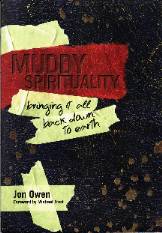Over the years I’ve read a lot of books about changing the church. Probably out of desperation, I think. Things really must change, and they are, but too slowly. I’ve read a lot of good books in that time, and bypassed a few that didn’t look so good.
But here’s four books I can recommend wholeheartedly. If you read them and take notice, they can hardly fail to challenge you and lead to your church being at least a little more effective in carrying out the mission Jesus left for us.
 The Shaping of Things to Come (Mike Frost & Alan Hirsch, 2003)
The Shaping of Things to Come (Mike Frost & Alan Hirsch, 2003)
For me, this is still the most radical and insightful book on the church I have ever read. Mike & Alan (both Aussies) look at the shape of postmodern, post christendom (i.e. the church is no longer in a privileged position) culture, and provide so many gems of understanding:
- the hallmarks of a truly missional church (rather than a comfortable one);
- the need to be incarnational (living our lives in the world) rather than attractional (inviting people to come into our world of unfamiliar language and services);
- assessing whether our church fits the context of our culture, or rather presents barriers to outsiders that will deter them from joining us;
- defining ourselves by Jesus and following him in truth;
- making mission our focus in everything we do;
- what apostolic leadership would mean today; and
- how to go about making the revolution happen.
This book is a gold mine. The tragedy is that even 8 years after it was written, so many christians, including pastors, continue to be unaware of the dynamite truths it contains.
The Wild Gospel (Alison Morgan, 2004)

Alison Morgan was a highly intelligent girl who studied at Cambridge, earnestly searched for truth through philosophy and literature, and found it in christianity. She later married a Church of England minister and was part of the ministry team at a large church in the UK. She led the prayer and counselling ministry that saw many people’s lives turned around.
The Wild Gospel is an account of the things she learned in this ministry. She examines the life of Jesus and the culture of today, and looks at what ‘works’ and what doesn’t. Her experience is that many people came to believe in Jesus through prayer ministry, because people really were healed and helped. You can read about her story at Philosophy is not enough and the story of one of those helped by the ministry at It lasts!
This book eludes categorisation. It has the rigour of a keen university-trained mind combined with the passion and heart of a person familiar with the working of the Holy Spirit. I found it challenging and inspiring, and believe it gives us one piece of the jigsaw of ministry to postmodern sceptical people.
No Perfect People Allowed (John Burke, 2005)

I’m normally wary of books by US pastors telling the story of how they established a new church and grew it to thousands of people, but this book is different. The stories are more about people whose lives were changed than about the pastor, the principles are truthful and helpful, and the stories are diverse and show grace in action.
The subtitle of the book is “Creating a ‘come as you are’ culture in the church”, and that is his main theme. He shows that so much of christianity these days (in the US at least) is legalistic and leaves people feeling condemned. Who would want to go to a church that makes you feel like that? John lays out another way – showing unconditional grace, welcoming people as they are without making judgments about them and giving the Holy Spirit time to work in his way in each person’s life. And so we find stories of goths and lesbians, bikers and business leaders, addicts of all types and people suffering from abuse and loneliness, and ordinary people too, who came to Gateway church and found acceptance, love, a lack of judgment, and eventually Jesus. You can read one of these stories at Fall in love and fall apart.
John has trained his church to avoid having judgmental attitudes and using in-group language, to welcome everyone who comes through their doors. They don’t water down the ethical teachings we have in scripture, but they apply them sensitively. There is so much in this book that almost every church and every christian (including me) needs to learn.
Muddy Spirituality (Jon Owen, 2011) 
Jon is an Aussie of Indian descent who has chosen to live in one of Sydney’s outer suburbs among people who are often poor, in dysfunctional relationships, unemployed, addicted and or involved in crime. He belongs to an urban mission organisation Urban Neighbours of Hope which believes mission should be done by those who sacrificially live in the same situation as those they minister to.
Jon is an engaging speaker, and his book is full of humour and stories, as well as common sense and challenge. He examines Jesus’ attitudes and approaches to people, and draws conclusions which he then applies to the situations he has encountered in urban mission.
Not everyone is called to re-locate, but I believe we are all called to make sacrifices to serve Jesus and to serve those who need help and hope. This book puts the challenge simply and compellingly, from someone who is walking the talk.